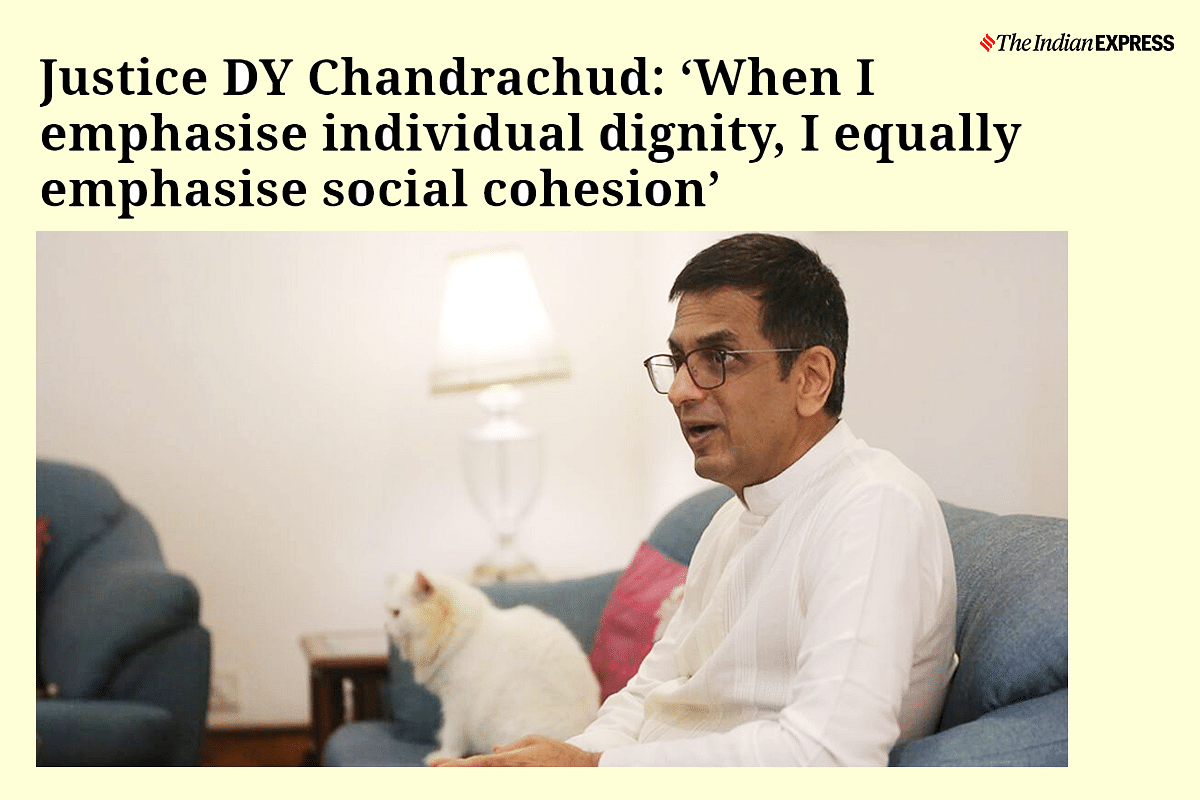Politics
Should Sitting Supreme Court Judges Or CJI-Designates Be Giving Media Interviews: What Does The Precedent And Protocol Say?
- CJI Chandrachud's interview to a newspaper has put protocols and precedents related to a judicial officer's conduct in the limelight.

CJI D Y Chandrachud.
Recently, in a widely circulated interview conducted by the Indian Express, new Chief Justice of India D Y Chandrachud is seen discussing a host of issues relating to judicial appointments, overruling his father’s judgement in the Puttaswamy Case, media scrutiny of judgements and the challenges he has as the topmost judicial officer.
This raised a number of questions. Foremost among them being:
Should judges be giving interviews to the media?
NO. As per charter on self-regulation for judges, titled ‘Restatement of Values of Judicial Life’, prepared by a committee headed by the then CJI and adopted by the full court of the Supreme Court in 1997, it has been categorically mentioned that a judge should not give interview to the media and is expected to let his judgements speak for themselves.
It also states that a judge should practise aloofness, consistent with his office’s dignity and not engage in public or political debates.
Are there any previous instances of public interviews by the CJI?
YES. Some of the former CJIs have given interviews to the media.
Therefore, it is made clear that the present opinion is not only concerned with Justice Chandrachud but also other CJIs and judges of the higher judiciary generally, who have appeared in one-on-one interviews with media outlets.
What impression does the interview with CJI Chandrachud create?
While researching for this report, we had the opportunity of reading several previous interviews given by former CJIs.
However, the stand-out aspect of the widely circulated interview of CJI Chandrachud is the special attention that seems to have gone in its aesthetic presentation. Justice Chandrachud is seen sitting in his stunningly decorated lounge in white kurta with his family.
Judges who interacted with the media previously, were mostly seen sitting in their office, in official attire and discussing matters of public importance.
In his interview, Justice Chandrachud discusses his family’s legacy on how he was called upon to overrule his father’s (former CJI Y V Chandrachud) judgement in ADM Jabalpur case.
He also discusses how a judge is trained to control his emotions while delivering judgements.
Interestingly, Justice Chandrachud has on several occasions previously discussed and celebrated his own judgments.
Recently, the UN High Commission conducted an event to celebrate the fourth anniversary of Section 377 Judgement, which decriminalised same-sex relations in India.
The guest of honour in this event was Justice Chandrachud, who was one of the five judges in the 377 judgement.
At the event, Justice Chandrachud discoursed on queer rights. Professor Shubhankar Dam, (Professor of Law, Portsmouth University, UK) interestingly commented that, “Chandrachud is still a judge and I struggle to recall when a sitting judge was so publicly involved in creating a legacy of their own decisions”.
Some commentators have also argued that it could be that CJI Chandrachud was wrongly advised on the ‘PR campaign’; but this is highly unlikely. Judges, and most importantly the residence of a CJI, is not a place anyone can enter into and click pictures on their own volition, without the express permission of the judge himself.
In the end though, we would do well to believe what CJI Chandrachud said in the corridors of the Supreme Court, right after taking his oath. When asked on how he will build trust of the general public in the Indian Judiciary, he replied, “My Work, Not Words, Will Speak”.
Support Swarajya's 50 Ground Reports Project & Sponsor A Story
Every general election Swarajya does a 50 ground reports project.
Aimed only at serious readers and those who appreciate the nuances of political undercurrents, the project provides a sense of India's electoral landscape. As you know, these reports are produced after considerable investment of travel, time and effort on the ground.
This time too we've kicked off the project in style and have covered over 30 constituencies already. If you're someone who appreciates such work and have enjoyed our coverage please consider sponsoring a ground report for just Rs 2999 to Rs 19,999 - it goes a long way in helping us produce more quality reportage.
You can also back this project by becoming a subscriber for as little as Rs 999 - so do click on this links and choose a plan that suits you and back us.
Click below to contribute.
Latest